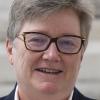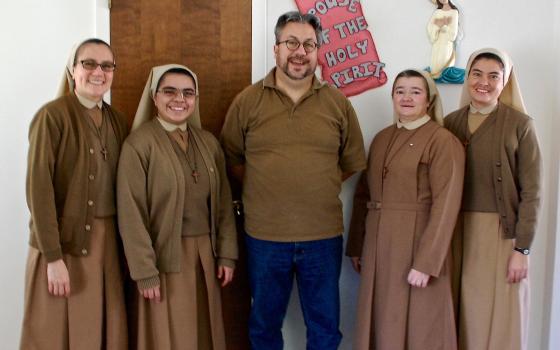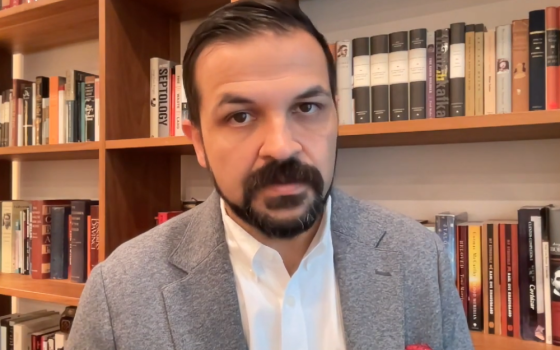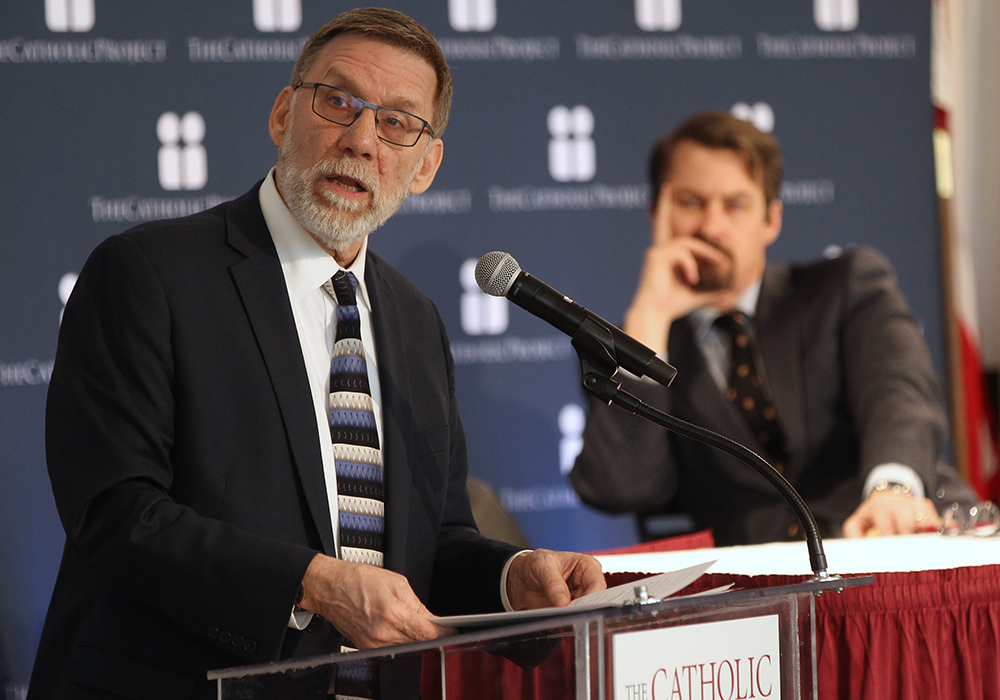
Richard Gaillardetz speaks March 26, 2019, during a panel discussion at a conference titled "Healing the Breach of Trust" at The Catholic University of America in Washington. Gaillardetz died Nov. 7, 2023. (CNS/Bob Roller)
With the passing of Richard R. Gaillardetz on Nov. 7, following a long struggle with cancer, the U.S. Catholic Church has lost a passionate witness of faith. Members of the theological community, especially in the theology department at Boston College, where he served two terms as chair and as the Joseph Professor of Catholic Systematic Theology, have lost an exemplary colleague and teacher.
Behind an impressive corpus of carefully researched and highly accessible writing, was a man who loved the church deeply even as he critiqued its institutional failures and called us to recover the virtue of ecclesial humility.
He was deeply mindful of the "unfinished" building project laid out by the Second Vatican Council, whose teachings on the dignity of the baptized faithful have yet to be fully received. He lamented the effects of a magisterium that stifled the theological creativity needed to inform the witness of the church. He regretted that a series of failures, including the crisis of clergy sexual abuse, has created a climate where "the term 'institutional church' carries largely pejorative connotations" and has come to be associated with ecclesiastical dysfunction.
Within the Catholic Theological Society of America, he worked to overcome polarization and to foster respectful conversation on theological diversity. He wrote bravely of his pain that his gay son felt compelled to leave the church because he loved someone of the same sex, giving voice to the grief experienced by many.
The final chapter of Rick's life followed a complex and often difficult course of dispossession and self-emptying. It began with a forced leave of absence in the spring of 2021 during an investigation into allegations of past abuse. Though the claims were proven to be unfounded, this was an excruciating trial where he was deeply distressed to be regarded with unjust suspicion by some and abandoned by others.
In the prolonged isolation of the pandemic, he lost his father among the more than 1 million U.S. victims of COVID-19. Then in February 2022, Rick received a diagnosis of stage 4 pancreatic cancer. It all seemed so unfair. Yet with surprising candor and vulnerability, he chose to share his journey with many friends and colleagues. As he began cancer treatment, he set up a blog where he generously shared his reflections with us at each step along his final journey. We beheld his grace-filled passage through the stages of anger and bargaining for more time, through the letting go of ego and learning to receive each day as a gift, and the slow surrender to being cared for lovingly by Diana, Andrew, David, Brian, and Greg.
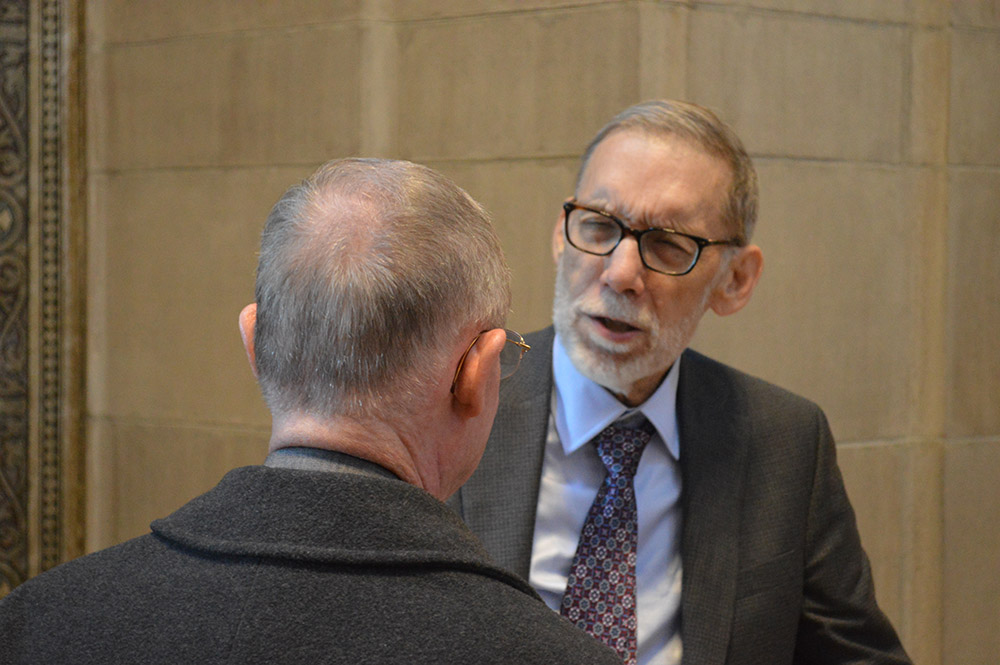
Richard Gaillardetz speaks with an attendee of the conference in his honor on Sept. 24, 2022, at Boston College. (Courtesy of the Lonergan Institute at Boston College)
In a final lecture delivered at Boston College on Sept. 23, 2022, entitled "Loving and Reforming a Holy Yet Broken Church," Rick drew back the curtain on how his cancer forced him "to contend rather intensely with the finitude, brokenness and suffering that is our lot as God's creatures."
He continued, "I must confess to having, more than once, hurled my complaints heavenward against the seeming injustice of it all. But I have learned, oh so slowly, that a time often comes when our laments and protests, justifiable in their own right, must yield to a more contemplative posture. There we are invited into the gracious mystery of divine providence in which, even as we realize that the complete eradication of suffering and injustice eludes us, God's grace still abounds."
In that same lecture he warned against the prevalence of the "virus of polarization" in the church, which "has infected our ecclesial and theological discourse." Appealing to the better angels of our nature he insisted that "the solution must lie in a commitment to sustained dialogical processes and the cultivation of habits, practices and dispositions that can transform our affective attachments and tribal tendencies and encourage us to engage with love and care those with whom we disagree."
Advertisement
He later welcomed Pope Francis' expansion of the Synod of Bishops to include non-ordained persons, including some 54 women, as full, voting members as an important step toward the development of an ecclesial institution characterized by a culture of encounter and dialogue, where the voice of all the Christian faithful might contribute to discernment and decision-making.
Rick lived to deliver another lecture in Rome, where he was able to meet with Pope Francis. He also lived to receive an honorary doctorate, to welcome the birth of his grandson, to attend a Bruce Springsteen concert, and to see his beloved Texas Rangers win a World Series pennant.
Rick had an esteemed career as a theologian and teacher. Before arriving at Boston College, he taught at the University of Toledo (2001-2011) as the Thomas and Margaret Murray and James J. Bacik Professor of Catholic Studies, and at the University of St. Thomas Graduate School of Theology in Houston, Texas (1991-2001). A generous friend and mentor to many, Rick served as the president of the Catholic Theological Society of America in 2013-14. He authored or edited over a dozen books and was a popular and engaging speaker at theological conferences and pastoral events.
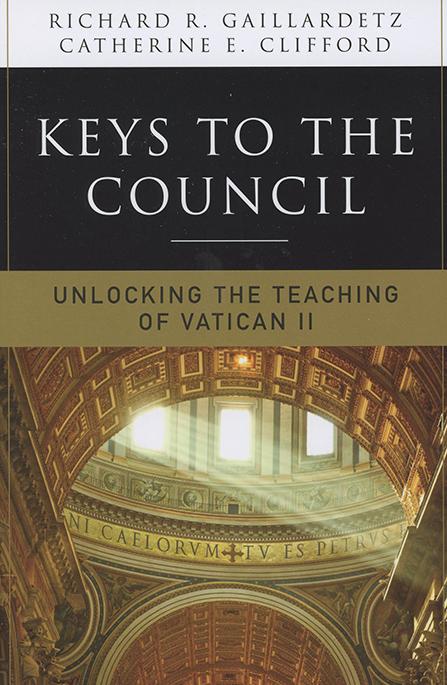
The cover of Keys to the Council: Unlocking the Teaching of Vatican II (CNS)
Three of his books are often required reading for students seeking to understand the Second Vatican Council: The Church in the Making (Paulist Press, 2006); Keys to the Council: Unlocking the Teaching of Vatican II (Liturgical Press, 2012), co-authored with myself; and The Cambridge Companion to Vatican II (Cambridge University Press, 2020).
Rick also wrote about the church in its global context: Ecclesiology for a Global Church: A People Called and Sent (Orbis Books, 2008); and about complex questions relating to the authoritative exercise of the magisterial teaching office: Witnesses to the Faith (Paulist Press, 1992); Teaching with Authority: A Theology of the Magisterium in the Church (Michael Glazier, 1997); and By What Authority? Foundations for Understanding Authority in the Church (Liturgical Press, 2018).
His book A Daring Promise (Ligouri Publications, 2007), is an insightful and mature reflection on the spirituality of marriage.
More recent writings reflect Rick's skills as an incisive interpreter of the pontificate of Pope Francis, a man given to teaching more by gesture and example than by decree: An Unfinished Council: Vatican II, Pope Francis, and the Renewal of Catholicism (Liturgical Press, 2015); Go into the Streets: The Welcoming Church of Pope Francis (Paulist Press, 2015), co-edited with Thomas P. Rausch; A Church with Open Doors: Catholic Ecclesiology for the Third Millennium (Liturgical Press, 2015), co-edited with Edward P. Hahnenberg; and The Priestly Ministry and the People of God: Hopes and Horizons (Orbis, 2022), co-edited with Thomas H. Groome and Richard Lennan.
"Dum spiro, spero," Rick wrote, at the end of every blog post about his cancer journey: "As long as I breathe, I hope." Even in the darkest night he dared to hope. "Now faith is the assurance of things hoped for, the conviction of things not seen" (Hebrews 11:1). May he now rejoice in the light of eternal love.
